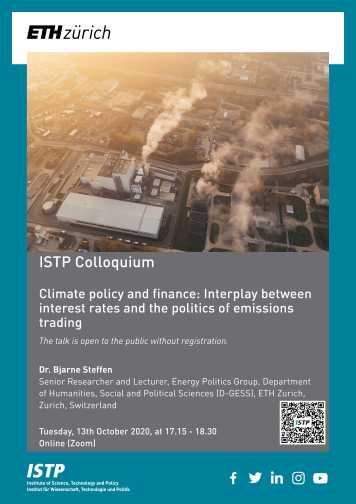Colloquium: Dr. Bjarne Steffen
Tuesday, 13th October 2020, at 17.15 - 18.30
Online (Zoom)
https://zoom.us/j/95519060280
Meeting ID: 955 1906 0280
Climate policy and finance: Interplay between interest rates and the politics of emissions trading

Mitigating dangerous climate change requires a rapid transition of economies towards low-carbon technologies, and emissions trading is widely thought to be a fail-safe instrument for achieving it. In emission trading policies, a cap serves as backstop that ensures emissions never exceed a certain level, and allowance prices automatically adjust to changes in economic and policy conditions. However, if prices become hockey stick-shaped, the resulting political pressure may soften the cap, implying the transition will not be followed through. Combing economics and political science, we conceptualize the feedback between allowance price and politics, and underline the importance of the discount rate (which closely links the general interest rate level in the economy).
Applying our framework to the European Union, we then quantify risk indicators for a softening of the cap. Particularly, we assess a scenario with market risk exposure for renewables and rising interest rates. Compared to a scenario extrapolating current conditions, we find that allowance prices double in the long-term. Moreover, renewable capacity deployment is substantially delayed in the mid-term, and fossil fuel plant profits surge rather than decline. This suggests a considerable risk that the cap will be softened.
About Dr. Bjarne Steffen
Bjarne Steffen is a senior researcher and lecturer with the Energy Politics Group since August 2016, and a visiting scholar with the external page MIT Center for Energy and Environmental Policy Research since February 2019. His research addresses politics and policies related to low-carbon innovation in the energy sector. He is particularly interested in the role of financial actors (e.g., investors and banks) in the ongoing sustainable energy transition, and the role of the state in the finance and energy sectors more generally. To this end, he works at the intersection of economics, political science, and innovation studies.
Before joining ETH Zurich, Bjarne worked as Principal in the external page Boston Consulting Group’s energy and infrastructure practices and was project manager for the Strategic Infrastructure Initiative at the external page World Economic Forum. He studied economics at external page University of Mannheim and the external page University of California at Berkeley, and holds a PhD in energy economics from external page University of Duisburg-Essen (chair Prof. Weber).
- You can read a summary of the colloquium talk on our Reports webpage.